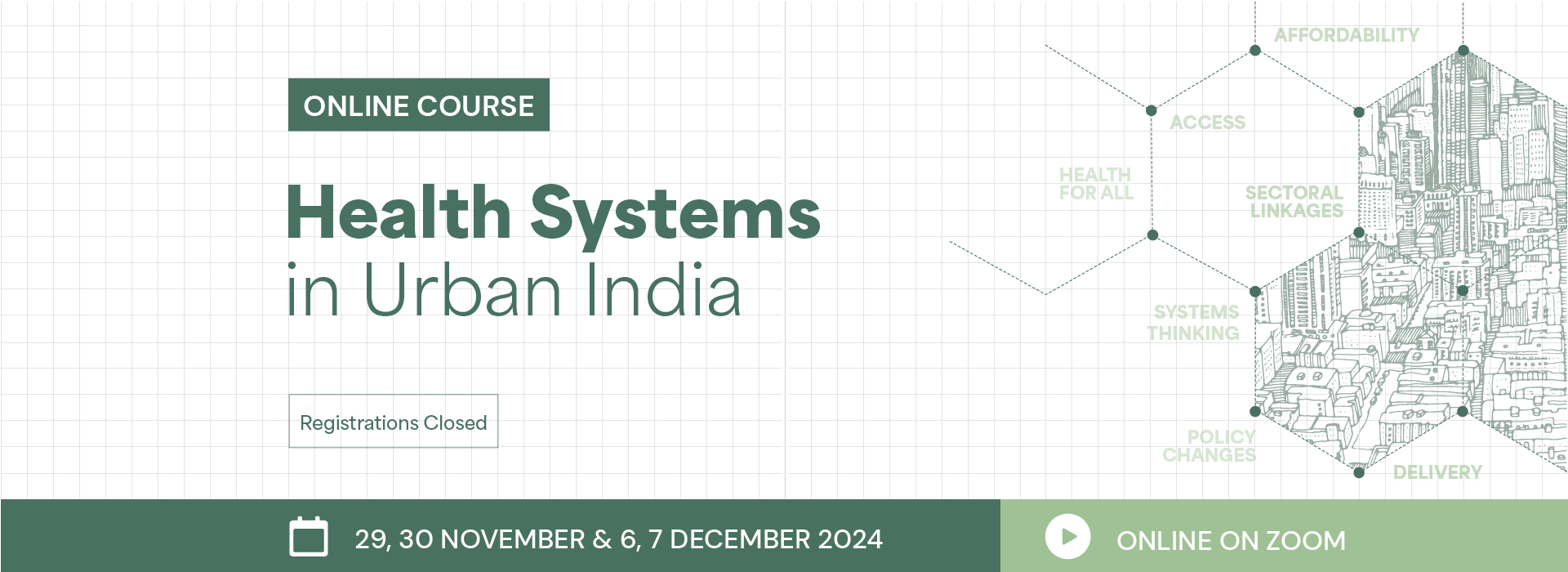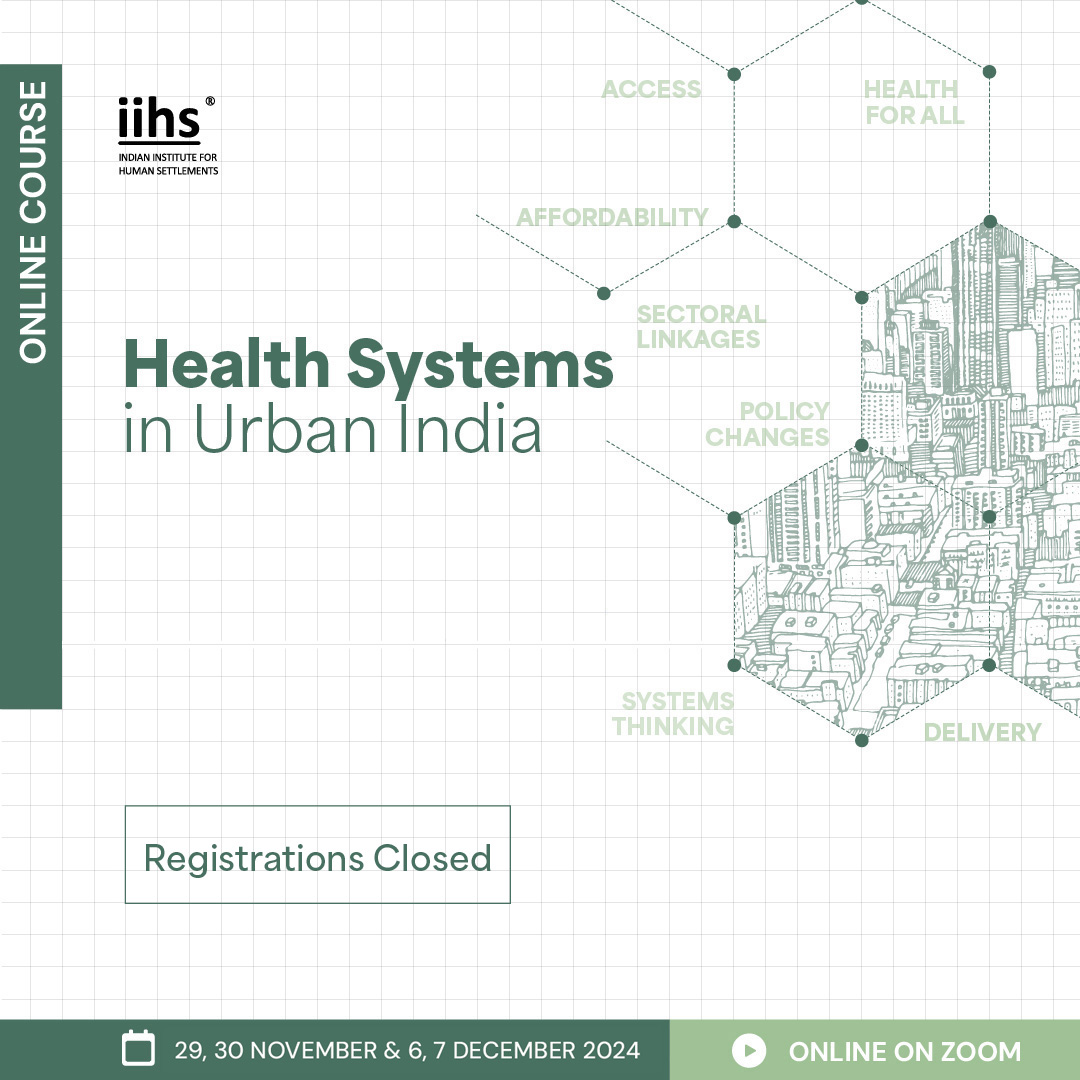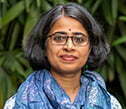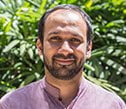

Registrations for the third iteration of this course are now closed. For further queries or to join the waitlist for the next iteration,
please email us on upp@iihs.ac.in.
IIHS’ latest online course, Health Systems in Urban India, is designed to provide an overview of health systems in the Urban, its different components and the major actors engaged in policy making, implementation and delivery of healthcare.
Given the complexities of the health sector within ever-expanding urban spaces and dynamics of mobility and migration, it is critical to develop a holistic understanding of health systems. Scaling up to cater to the mantra of ‘health for all’ for a sustainable urban future requires looking at current as well as future needs. It is also important that professionals beyond the bio-medical disciplines understand health systems and integrate it in their thinking and practice.
The Health Systems in Urban India course will help a diverse set of participants foreground contemporary issues in the sector with national and international contexts, including a transition towards the Sustainable Development Goals and the emerging approach of ‘Health in All’ policies and their implementation.
Who this is for
- Young researchers working in academia/ social sector/ community based organisations, who are interested in urban health from different entry points
- Post graduates/ PhD scholars interested in urban health and sustainable development/ health systems/ health systems policy
- Policymakers / administrators, who are new to the health sector and those who work in the overlapping areas of health (water and sanitation, public health engineering, health financing, etc.), who want to understand the health sector better
- Designed for a wide range of health and non-health sector urban professionals
Learning Objectives
- Apply systems thinking to understand health systems
- Explore intra- and inter-sectoral linkages of health systems in cities
- Examine recent policy changes in health systems in the Urban
- Understand the concepts of universal health coverage
- Analyse health in connection with other urban systems/ sectors
 Aruna Bhattacharya
Aruna Bhattacharya
Aruna leads work on urban health, health systems policy research, and health impacts of climate change in vulnerable and marginalised settings at the IIHS School of Human Development. She is trained in medical anthropology and holds a PhD in anthropology from the University of Delhi. She has been working in the health systems policy research space from the vantage point of implementation of national health programmes in marginalised settings since 1998.
Aruna has taught public health and carried out several research studies at the intersection of public health and health systems policy research as Principal Investigator (PI) and co-PI with national and international funding, as Associate Professor, Indian Institute of Public Health-Delhi, Public Health Foundation of India.
Aruna was part of the Government of India’s Common Review Missions for National Rural Health Mission/ National Health Mission (NRHM/ NHM). She is an active member of the Health Systems Global (HSG) SHAPES consortium. Aruna is trained in ‘Ethics in public health research’ at the Harvard School of Public Health. She is a recipient of the Australia Leadership Award Fellowship (ALAF) for public health practice in HIV/ STI. Aruna has long-standing collaborations with Harvard School of Public Health, Sydney University, and University College of London among others, for research and capacity building in public health.
 Gautam Bhan
Gautam Bhan
Gautam teaches, researches and writes on the politics of housing, urban poverty and inequality, urban and planning theory, and identity and social practice. He anchors IIHS’ work as a Centre for Excellence with the Ministry of Housing and Urban Affairs; as well as a knowledge partner to urban movements for housing rights. As Associate Dean of the IIHS School of Human Development, he leads work on urban welfare regimes, social protection and informal work. His projects include work on child health outcomes for children of informal workers in domestic work and construction, as well as advocacy work on urban social protection regimes. He holds a PhD in City and Regional Planning from University of California, Berkeley and is widely published. He is the author of ‘In the Public’s Interest: Evictions, Citizenship and Inequality in Contemporary Delhi’ (University of Georgia Press 2017; Orient Blackswan 2017) and is co-editor (with Smita Srinivasan and Vanessa Watson) of the Routledge Companion to Planning in the Global South (Routledge 2018).
 Namrata Kapoor
Namrata Kapoor
Namrata anchors the housing work at IIHS along with her colleague Gautam Bhan. She has over 13 years of experience as a consultant for various governments, NGOs, real estate and planning consultancies, and academic institutions. Her research and practice work focusses on the intersection of transit, housing and health.
Namrata’s affordable housing research and policy work spans nine Indian cities. As an urban planner, she has worked on transit oriented development plans and city Master Plans in Mumbai, Bangalore, Hubli-Dharwad and Bhubaneswar. She is on the Supreme Court-appointed Independent Impartial Committee on Urban Homelessness. Namrata has a dual degree in Architecture and City Planning from the University of California, Berkeley.
Programme Structure
- Four days online course
- Delivered through a combination of in-class lectures and discussions, case studies and hands-on activities
- High degree of application orientation and peer learning
Key Differentiators
![]()
| Friday, 29 November 2024 | |
| 14:30 – 15:30 | Systems Thinking and Health Systems |
| 16:00 – 17:30 | Systems Thinking
(Case Study and Group Discussion – Aruna Bhattacharya) |
| Saturday, 30 November 2024 | |
| 10:00 – 11:30 | Social Determinants of Health (SDH) |
| 12.00 – 13:30 | SDH and Urban Marginalisation
(Case Study and Group Discussion – Gautam Bhan) |
| 14:30 – 15:30 | SDH and Universal Health Coverage (UHC) |
| 16:00 – 17:30 | Group Exercise |
| Friday, 6 December 2024 | |
| 14:30 – 15:30 | UHC and Primary Health Systems in the Urban |
| 16:00 – 17:30 | Primary Health Systems in the Urban
(Case Study and Group Discussion – Aruna Bhattacharya) |
| Saturday, 7 December 2024 | |
| 10:00 – 11:30 | Built Form Design and Health Outcomes
(Case Study and Group Discussion – Namrata Kapoor) |
| 12:00 – 13:30 | Health Systems in the Urban – Group Exercise |
| 14:30 – 15:30 | Group Presentations |
| 16:00 – 17:30 | Closing Remarks,
Q&A and Discussions |
Programme Details:
- Course Format: Live Online
- Course Dates: 29, 30 November and 6, 7 December 2024
- Course Fees: Rs.8,850/- inclusive of GST
- Early Bird Fee II (5% off): Rs.8,408/- inclusive of GST
- Last date for Early Bird Discount: 8 November 2024
- For queries, get in touch with us at upp@iihs.ac.in or 9611911169
<< Back



